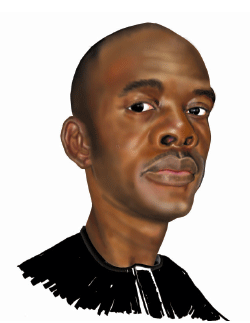By Ikechukwu Amaechi

Martins Oloja, former editor of The Guardian, pulled me aside as I stepped into Sheraton Hotel, Ikeja, on Tuesday, November 19 for the 7th anniversary lecture of Realnews magazine and asked if I heard any news about Henry Boyo.
It wasn’t an unusual question. All of us are members of the League of Nigerian Columnists (LNC) and interact regularly.
So, I didn’t think much of the question. I simply riposted, no! With the expression on his face bland, Martins didn’t give anything away either as he said “okay, thanks.”
Of course, the last thing on my mind was death. I spoke with Boyo on the phone the week before and we scheduled to meet in his office that week.
You can then imagine my shock when Professor Anthony Kila, the LNC secretary, broke the sad news later that day. It was a bombshell.
“Greeting sirs, we have bad news at the League. It appears that we have lost Sir Henry Boyo, a pioneer and committed member of the League.
“The news was carried in the Vanguard newspaper of today. I am still trying to reach the family but without luck thus far,” Kila said in a terse WhatSapp message.
On November 20, the day we agreed to meet, I went to Boyo’s Ikeja office to reconfirm the news of his death. His distraught secretary was inconsolable.
He was hale and hearty when they said their goodbyes on Saturday, November 16, she told me. How could she have known that was the last goodbye?
On the fateful Monday, she was already in the office waiting for him when she got a phone call to come over to the hospital. When she got there, Boyo was already dead.
Boyo’s son was worst hit. When I expressed my condolences, he was still in a trance, hoping it was all a bad dream. There is still the sense of denial, understandably. He was with his father that morning as he prepared for the office when fate, without any premonition, dealt them a bad hand. It happened so fast.
Dying at 72, the popular refrain would be, “but he tried.” That may not be out-of-place. In a country where life expectancy is 53 years, 72 years may well be old age.
But that in reality is the tragedy of our situation. Our penchant for celebrating mediocrity and hoisting commonplace on the totem pole of great achievements is unbelievable.
The world has left Nigeria behind. In Japan, for instance, where the average life expectancy in 2018 was 87.32 years for women and 81.25 years for men, dying at 72 is untimely death; literally.
Some 88.1 per cent of women and 75.6 per cent of men born in 2018 have a chance of living until 75 years, while 50.5 per cent of women and 26.5 per cent of male Japanese will live for 90 years.
According to its 2017 census, Japan currently has 67,824 centenarians, a proportion of 34.85 per 100,000 people. Hong Kong, where life expectancy for women is 87.56 years and 82.17 for men, is even doing better.
Spaniards are also living it up with women averagely spending 85.73 years on earth and men 81.4 years.
The figure from Japan is an increase of more than 2,000 centenarians from 2017 and a dramatic increase from 153 centenarians in 1965 when the country began collecting data on those who had lived past 100.
These incredible feats are achieved with zero medical tourism.
But the bigger tragedy is that Boyo died a frustrated man. On a personal level, Boyo, who studied economics at the University of London in the early 1970s, was an entrepreneur par excellence, a very successful businessman.
He made a huge success out of all his human endeavours, except one: convincing fellow countrymen to step back from the path of economic perdition. And therein lies the frustration.
As Kila aptly noted in a tribute, Henry Boyo the inventor, economist, manager, thinker, writer, philanthropist and a leading figure in the League of Nigerian Columnists, “was a brilliant mind with great ideas that Nigeria failed to examine.”
I first met Boyo at Independent Newspapers Limited. In the nine years I was editor of Sunday Independent and later Daily Independent, he was a permanent feature on the editorial board every Wednesday, his voice resonating loud and clear.
He had only one agenda: to defend the naira and save Nigerians from what till death he saw as the failed monetary policies of the government.
Boyo believed that at the heart of the colossal poverty in the land is the mishandling of the foreign exchange regime. To lift Nigerians out of poverty, the naira must be rescued, he advocated.
Never in the history of this country have we had a single-agenda columnist who devoted his entire career trying unsuccessfully to convince the authorities to do what he thought was the right thing.
More frustrating for him was that he saw as simple and uncomplicated, his excess liquidity theory. If it is, why then nobody heeded his advice, or even made any attempt at interrogating his hypothesis?
Perhaps, it is safe to argue that it was implausible for successive Nigerian governments to elevate the ideas of a man who blamed their wrongheaded economic policies for the country’s widespread poverty and misery.
Successive Central Bank of Nigeria (CBN) governors took notice of his interventions but quietly ignored him. I remember one of them calling his ideas weird.
But such charges never worried Boyo. “Look, if I write anything that is nonsense they would have finished me and I won’t have the courage to continue doing what I’m doing today,” was his typical response.
He was perplexed and at the same time amused that no government official ever took up his challenge for an open debate.
Any time the vexing issue of fuel subsidy removal cropped up during our editorial board meetings, Boyo would shake his head incredulously. “Why is it that these people don’t get it,” he would ask.
“The naira value vis-à-vis the dollar is a significant determinant of the local price of fuel. Unfortunately, neither the media nor labour unions, nor indeed government seems to recognise this reality! Consequently, Nigerians are misled into searching for solutions to fuel subsidy removal everywhere else but this one,” he once wrote in his column in Punch.
He told TheNiche recently: “Excess liquidity drives inflation, inflation drives MPR (benchmark lending rate), MPR drives higher cost of funds, higher cost of funds drives higher cost of production; inflation and higher cost of funds make you uncompetitive, and inflation at 20 per cent makes certain that we’ll all be poor.”
Unless and until Nigeria’s economic managers device a means of distributing crude oil dollar earnings in dollar certificates, Nigeria will continue to wallow in the jungle of economic adversity, Boyo insisted.
So, why didn’t anyone listen to him? Not even Boyo himself could hazard a guess.
Boyo, Oloja, Jimanze Ego-Alowes and I had a discussion on the state of the Nigerian nation after our last LNC general meeting in Ikeja.
Boyo was very worried at the direction Nigeria was headed. Not a man given to wearing his emotions as an epaulet on his trademark jacket, he was, nevertheless, apprehensive.
How could a country with so much potential perpetually plumb the depths of misery and despair, Boyo asked. Why is nobody listening? he soliloquized before acknowledging he was beginning to sound like a broken vinyl record.
We had no answers to his rhetorical questions. But we all know the fault was not his.
Sir Henry Boyo was a good man, suave, decent and a true patriot, who dedicated his entire life to the service of fatherland. He was an intellectual powerhouse, quick off the mark, and perspicacious.
He was not an armchair critic. No! He was an industrialist, who created jobs and walked his talk. He related well with the old and the young. He loved dialectics. An intellectual pugilist who never shied away from a debate.
Even when you disagreed with him, he did not raise his voice but was never cowed. He bowed to the superiority of your logic but was supremely confident in the sagacity of his own logic. His lucidity was awesome.
Will his death spur the country that spurned his ideas while he was alive to revisit them? Time will tell. Goodnight Sir Boyo!














